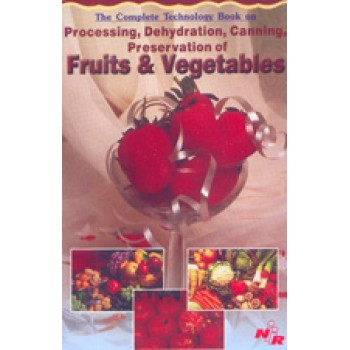The Complete Technology Book on Processing, Dehydration, Canning, Preservation of Fruits & Vegetables
| Price: | Rs.1,575.00 |
Detail Of The Complete Technology Book on Processing, Dehydration, Canning, Preservation of Fruits & Vegetables
| ISBN | 8186623698 |
| Pages | 862 |
| Language: | English |
| Product Code: | 1 |
| Size(in cm): | 21*13.5 cm |
| Weight(in grams): | 500(approx) |
Description:
Our country is blessed with an abundance of fruit and vegetable crop. India ranks first in the world in production of fruits and second in vegetables, accounting roughly 10 and 15 per cent, respectively, of total global production. Preservation technology deals with the process of treating and handling food to stop or greatly slow down spoilage (loss of quality, edibility or nutritive value) caused or accelerated by micro organisms. Maintaining or creating nutritional value, texture and flavour is important in preserving its value as food. This is culturally dependent, as what qualifies as food fit for humans in one culture may not qualify in another culture. Some preservation methods require the food to be sealed after treatment to prevent recontamination with microbes; others, such as drying, allow food to be stored without any special containment for long periods. Successful processing and preservation of foods can lead to number of economic activities like newer techniques of fruit and vegetable preservation, starting up a small scale industry or production unit or developing new products, etc. some of the important process of preservation are drying, canning, freezing etc.
Canning is one of the various methods of food preservation in which the food is processed and then sealed in an airtight container. This process prevents microorganisms from entering and proliferating inside. Various foods have altering degrees of natural protection against spoilage. High acid fruits like blackberries require no preservatives to can and only a short boiling cycle, whereas marginal fruits such as tomatoes require longer boiling and addition of other acidic elements. Low acid foods, such as vegetables and meats require pressure canning. Food preserved by canning or bottling is at direct risk of spoilage once the can or bottle has been opened. Food processing is the set of methods and techniques used to convert raw ingredients into food or to transform food into other forms for consumption by humans or animals either in the home or by the food processing industry. Benefits of food processing include toxin removal, preservation, easing marketing and distribution tasks, and increasing food consistency.
Dehydration is the process of removing water or moisture from a food product. Food dehydration is safe because water is removed from the food. Because water is removed from the food, mold and bacteria cannot grow on it; thus it will not spoil. Dehydrated foods are ideal for backpacking, hiking, and camping because they weigh much less than their non dried counterparts and do not require refrigeration. Drying food is also a way of preserving seasonal foods for later use. Foods can be spoiled by food microorganisms or through enzymatic reactions within the food. Reducing the moisture content of food prevents the growth of these spoilage causing microorganisms and slows down enzymatic reactions that take place within food. The combination of these events helps to prevent spoilage in dried food. The dehydration of fruits and vegetables does not alter the calorie count. Calories become concentrated into a smaller, more compact mass without the zero calorie water. Freezing is also one of the most commonly used processes commercially and domestically for preserving a very wide range of food including prepared food stuffs which would not have required freezing in their unprepared state. It is the art of preparing, packaging, and freezing foods at their peak of freshness. The keys to freezing food are to make sure it is absolutely fresh, that you freeze it as quickly as possible, and that you keep it at a proper frozen temperature (0 degrees). Cold stores provide large volume, long term storage for strategic food stocks held in case of national emergency in many countries. In the coming years India share in the global processed food industry will get a raise from one per cent to three per cent. In order to avoid post harvest losses, it becomes imperative to preserve the product. As a result food preservation industries have emerged everywhere. Indian food processing industry is widely recognized as a sunrise industry having huge potential for uplifting agricultural economy, creation of large scale processed food manufacturing and food chain facilities, and the resultant generation of employment and export earnings.
This is a comprehensive book which deals with processing, dehydration, canning, preservation of various fruits and vegetables. Information on quality control and other parameters has been discussed in this book which is necessary for this type of project. Each chapter gives theoretical as well practical information to understand the basic principles and methodology.
The major contents of the book are general properties of fruits and vegetables (chemical composition and nutritional aspects), procedures for fruits and vegetables, chemical preservation of food, food preservation by canning and fermentation, list of fruit beverages, types of containers for food canning and many more that gives you a complete knowledge.
This book is very useful for new entrepreneurs, professionals, research institutions, libraries, for those who want to diversify in the field of fruits & vegetables, processing and canning.
Reviews (0)
Write a review
Your Name:Your Review:
Note: HTML is not translated!
Rating: Bad Good
Enter the code in the box below:
Recently Viewed



 |
| 
